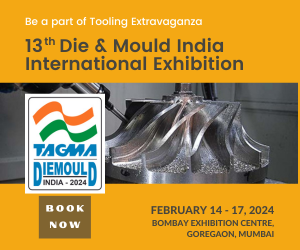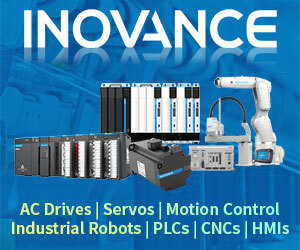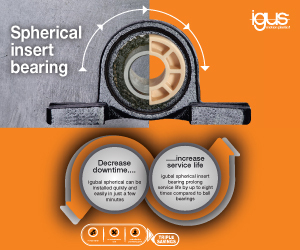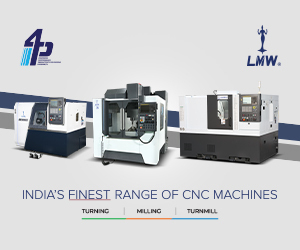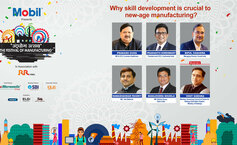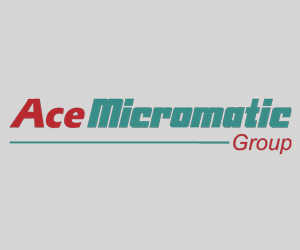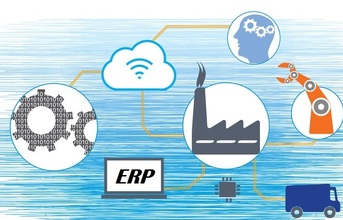
Manufacturing, as we know it, is transforming; technology is remodelling the very shape of the shop floor. The entire manufacturing process - from design to delivery - has compressed owing to integration of old and new technologies and methods. They more reliable with use of virtual reality, faster and proven conversion methods, and are now becoming efficient with the onset of industry 4.0 practices. A widespread consciousness on environment and sustainability is also propagating green products and practices.
Welcome to the world of modern manufacturing powered by the Industrial Internet of Things (IIoT) and Artificial Intelligence (AI), which is transforming industrial processes and forming a foundation for future factories. Innovative mindset is driving the advent of new technologies and business models opening up new pathways for economic, technical and logistical advantages in the manufacturing domain. While the sheer pace of these transformational changes makes it challenging to foresee the scenario even ten years down the line, consensus is building around the thought that successful manufacturers of tomorrow will be the ones that will have pioneering technologies in their domain and compliant business practices supporting a sustainability-focused world.
Industrial Ascent
Industrialization has been an ever-evolving phenomenon, with manufacturing and industrial capacity proving to be the mainstay of economic growth for nations over the years. After the first industrial revolution that began in Britain in the late 18th century with the mechanisation of the textile industry, the second revolution was pioneered by the legendary Henry Ford, ushering in the age of assembly lines and mass production; the third had technology playing a key role where mechanics converged with computers to create a digital world of robots and processes. The intervention of information technology was a disruption which was characterized by high-end technology and intuitive systems which bettered performance, improved precision and enhanced production.
Today, we are on the cusp of the fourth industrial revolution, or Industry 4.0 as we know it. A new form from the world of ‘brick & mortar' to digital. This is the next phase - of digitalisation - where manufacturing is seeing a tectonic shift towards the development of ‘smart factories' that will dot the entire manufacturing landscape over the next decade. This evolution necessitates unprecedented levels of integration between information, communication and manufacturing processes. Today, the need for flexible solutions, customized products and efficient back-end processes has led to complexities in production. Focus is to enable the resources to produce more and faster.
As industries have evolved, so has the need for reimagining and redesigning the work processes. To accelerate efficiency and enhance productivity, manufacturers are investing in smart technologies and automation solutions. The new order of a connected industry environment has brought about the emergence of cyber-physical systems, driven by IoT, AI and cloud computing. The transformational era of Industrial Internet of Things is here and it's time to adapt to the new order.
Future Focused
Industrial IoT offers opportunities to redefine many sectors and accelerate economic growth by making products and processes smart. There is a need to articulate the pointed benefits from such investment and justify the ROI. As India progresses in its pursuit to become a preferred manufacturing destination with its Make In India initiative, adoption of competitive practices like IIoT to enable industrial transformation are a must. Opportunities exist in the way we conceive, validate and develop solutions for customers and also in our own back-end operation. A mind set for continuous improvement should be nurtured by leadership. The Union Government's recent announcement in the Budget to create an allocation of Rs.8000-crore for AI, data analytics and quantum computing is a major step in that direction, giving the manufacturing sector an edge in the years to come.
Even as vertical system integration digitalises, integrates processes and optimizes operational efficiency, data analytics provides valuable insights that facilitates productivity and improves quality. Computer Aided Engineering/Design/Manufacturing (CAE/D/M) is enabling manufacturing of parts and products at a fraction of benchmark timelines reliably. It is necessary to partner with experts and right technologies in the value chain to meet the growth and competitiveness target. On its part, the Godrej Group is committed to drive this growth by helping develop next-generation products, services and digital solutions.
Enabled by cutting-edge technologies, factories of the future will yield huge benefits in sustainability and resource consumption, cutting gas emissions, using fewer resources, slashing lead times and production timelines, while creating components with greater durability and lifespans. In our factory, we have deployed IIOT for data analytics on energy consumption and product life enhancement. In the same way, these future technologies will also allow much faster repairs, while facilitating easier upgradation to the next generation of application. As investments required for implementation of new technologies will shrink in coming years and skilled workforce will be developed to work with the new technologies, factories of the future will take rapid strides in their journey to modern manufacturing.
The Sustainability Imperative
Be it plastic, greenhouse gases or atmospheric pollution, businesses are engaged with a lot of it. In this context, going forward, the challenge will be to address climate change issues. Operations have to rise to a sustainable level. Manufacturers will have to play a huge role to achieve this. The challenge is to create a better system and sustainable processes for the future. The need of the hour is to go beyond legal compliance, and create a framework to move towards International Standards for sustainability. Being energy efficient, environment-friendly, people-friendly and community conscious is not only fundamental to sustainability, but also a key contribution to competitiveness. As part of our Good & Green initiative at Godrej Group, we have a goal to reduce energy consumption by 30 per cent. Similarly, we have goals to send zero-waste to landfills, increase usage of renewable energy, become water positive and go carbon neutral. Each of these sustainability goals also boost competitiveness and contribute to the bottom-line.
As we prepare for 2030, the way forward is to invest in innovation, adopt cutting-edge technologies, explore new forms of collaboration and develop new business models which will be consistent with the new economic order - the sustainable world order. In terms of fiscal numbers, future-proofing growth in a resource-scarce country and accelerating India's circular economic shift has almost $500-bn dollar worth of GDP value at stake. This potential can be unlocked and protected through the adoption of circular economy principles in India by 2030. The circular economy goal is a huge challenge as well as an opportunity; organizations that are willing to re-invent themselves will be at the forefront of this transformative journey.
END













